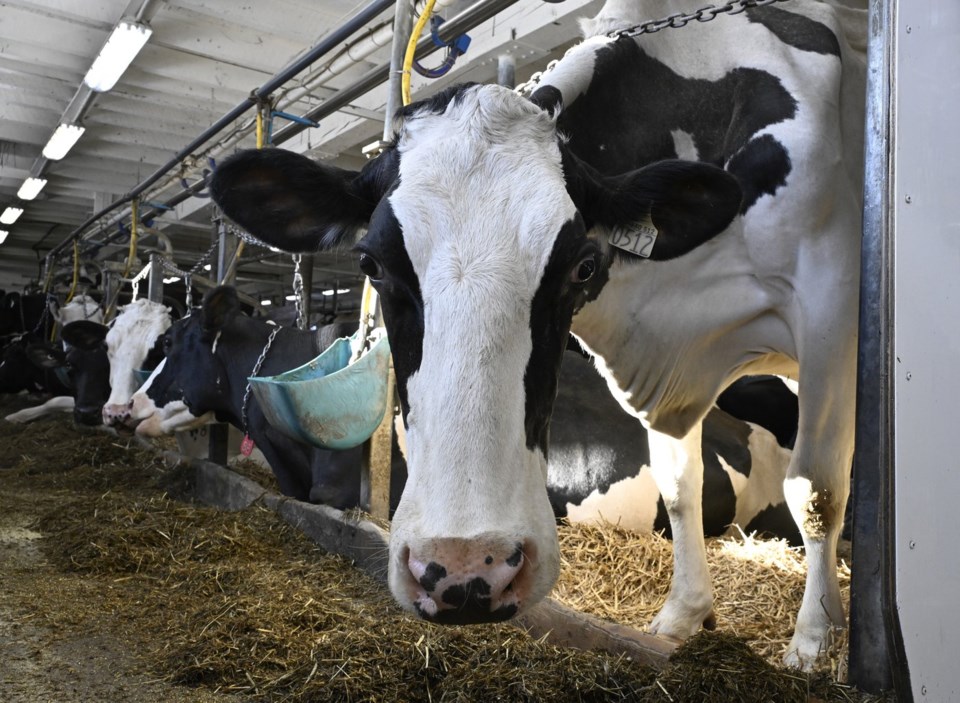CALGARY — As an outbreak of avian influenza in dairy herds south of the border continues to spread, Canadian officials say they are doing everything they can to protect this country's livestock industry.
Since March — when a highly contagious strain of A(H5N1), or bird flu, was first discovered in dairy cows in Texas — a total of 68 herds in nine U.S. states have confirmed cases of infection.
Last week, a third human case of the virus was identified in a dairy farm worker in Michigan.
So far, not a single case of the disease has been found in Canadian cows. But the possibility that it could show up here is real, said Dr. Martin Appelt, senior director of animal health programs for the Canadian Food Inspection Agency.
"The risk is certainly there," Appelt said.
"And that certainly puts Canadian dairy producers in an awkward position, which I fully appreciate, which is what happens if it happens?"
The CFIA is preparing for the possible emergence of cases of avian flu in livestock on this side of the border through enhanced surveillance and testing. Lactating dairy cattle being imported from the U.S. to Canada require a negative test for the virus before they can cross the border, and the CFIA is also conducting tests of milk destined for retail sale to look for traces of the virus.
While the science around avian flu and its transmission is still evolving, there are indications that the virus can replicate rapidly in the mammary glands of lactating cows, which may be why dairy cattle have proved to be particularly vulnerable to catching the disease.
Signs to watch for in dairy cattle that could indicate infection include a decrease in milk production, thicker milk consistency and a loss of appetite.
Fortunately for Canadian dairy producers, avian flu appears to only cause mild and transitory illness. And while traces of the virus have been found in the milk of infected U.S. cows, pasteurization — which is required for all Canadian milk sold in stores — has been shown to effectively kill the virus.
That means even if the disease turned up in Canadian cows, commercially sold milk and milk products would remain safe to consume, Appelt said.
In an emailed statement, the Dairy Farmers of Canada industry group said it is in "close communication" with the CFIA as it monitors the situation.
The Canadian Cattle Association, which represents beef farmers and ranchers, said in its own statement it is "watching this issue very closely."
It remains unclear if the virus poses a threat to beef cattle, Appelt said. But he added the CFIA is working to develop a comprehensive plan that would expand the agency's surveillance efforts beyond birds and dairy cattle to potential "other eventualities."
"We definitely want beef producers to consider the possibility (of virus transmission)," he said.
Dr. Rob Tremblay, an Ontario-based bovine health specialist who has been advising Dairy Farmers of Canada on the avian flu issue, said farmers who are concerned about the virus can reduce the likelihood of their animals being exposed by maintaining a "closed herd" for the immediate future.
"That means don't purchase animals, at least for the time being, unless it's absolutely necessary," he said.
When avian flu is found on a poultry farm in Canada, the CFIA places the farm under quarantine and orders the birds destroyed to prevent spread of the disease. (The disease spreads rapidly between birds and carries a high bird mortality rate).
When the illness appears in cattle, it tends to be milder and the animals generally recover on their own so infected cows don't need to be culled, Tremblay said.
In addition, the World Organization for Animal Health does not recommend international trade restrictions or import bans on dairy or beef products from countries that have had cases.
Tremblay said that means if Canada were to have its own outbreak of avian flu in a domestic dairy herd, the economic implications would be less severe than certain other animal illnesses. The deadly pig disease African swine fever, for example, has never been found in Canada but a single case could result in countries around the world shutting their doors to Canadian pork products. That would not happen in the event of avian flu.
Still, for an individual farmer, a discovery of avian flu in their dairy herd would be a significant blow, Tremblay added.
"The loss of milk, the extra work, the cost of dealing with animals that are sick and the stress that's associated with that — I think it could be personally devastating, for sure," he said.
"And it would have a financial impact at the farm level."
— With files from The Associated Press
This report by The Canadian Press was first published June 5, 2024.
Amanda Stephenson, The Canadian Press




